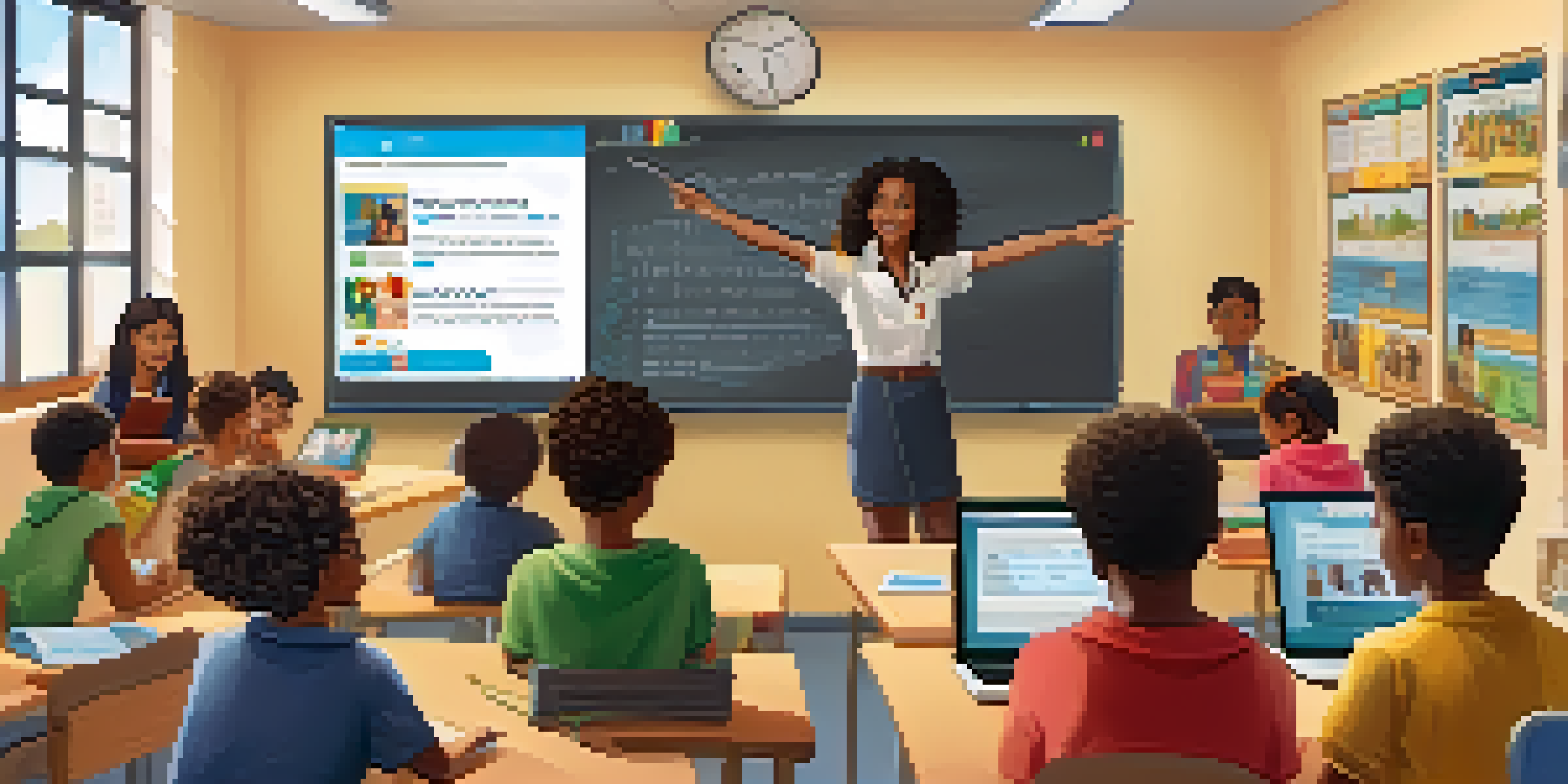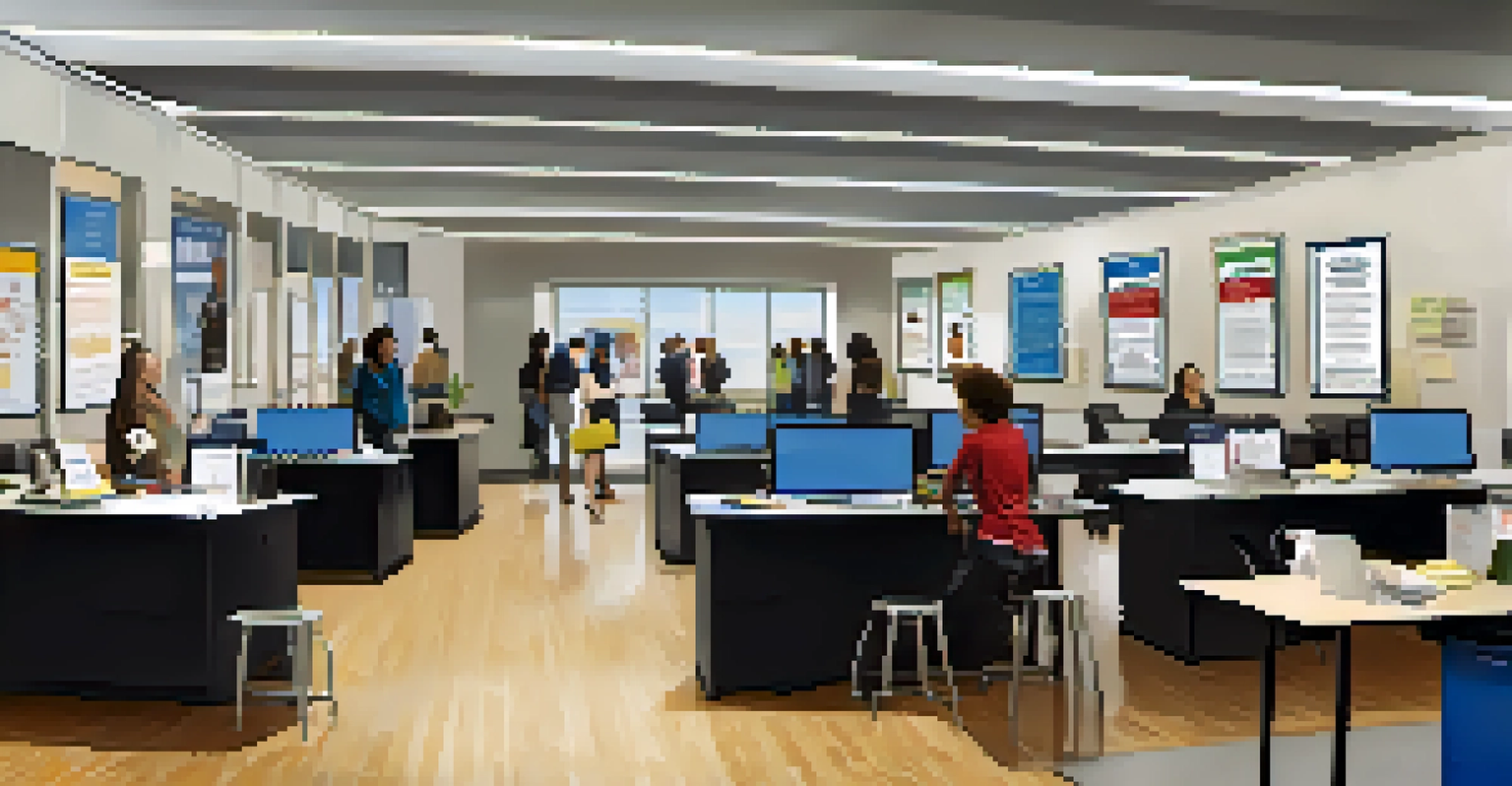The Future of Higher Education in Florida: Trends and Predictions

The Shift to Online Learning: A Permanent Change
The COVID-19 pandemic accelerated the adoption of online learning, transforming how students engage with education. In Florida, many universities are now offering hybrid models that blend both in-person and online classes, catering to diverse student needs. This shift not only enhances accessibility but also allows institutions to reach a broader audience, including non-traditional students who may have work or family commitments.
Education is the most powerful weapon which you can use to change the world.
As technology continues to evolve, we can expect further innovations in online education, such as virtual reality classrooms and AI-driven tutoring systems. These advancements promise to create a more interactive and personalized learning experience. For instance, students in rural areas can access courses that were previously unavailable, leveling the playing field across the state.
While online learning has its advantages, it also poses challenges, such as maintaining student engagement and ensuring academic integrity. Institutions will need to invest in training for educators and develop robust support systems to help students thrive in this new environment.
Emphasis on Skills-Based Learning and Certifications
In response to the rapidly changing job market, Florida's higher education institutions are increasingly focusing on skills-based learning. This approach prioritizes practical skills and competencies that align with industry needs, providing students with a more relevant education. Programs offering certifications and micro-credentials are becoming popular, equipping graduates with specific skills that employers value.

For example, partnerships between colleges and local businesses are emerging, allowing students to gain hands-on experience through internships and co-op programs. These collaborations not only enhance students' resumes but also help businesses find qualified candidates. As a result, we’re seeing a shift away from traditional degree programs toward more flexible and targeted educational pathways.
Shift to Online Learning
The pandemic has permanently changed education, leading to hybrid models that enhance accessibility and cater to diverse student needs.
This trend is particularly beneficial for adult learners looking to upskill or switch careers. By offering shorter, focused programs, institutions can cater to those who may not have the time or resources for a full degree, ultimately supporting lifelong learning.
Diversity and Inclusion in Higher Education
Florida's higher education landscape is becoming increasingly diverse, reflecting the state's rich cultural tapestry. Institutions are recognizing the importance of creating inclusive environments where all students feel welcomed and supported. This commitment to diversity not only enhances the educational experience but also prepares students to thrive in a global workforce.
The future belongs to those who believe in the beauty of their dreams.
To promote inclusivity, universities are implementing programs that address the unique challenges faced by underrepresented groups. These initiatives may include mentorship programs, scholarships, and culturally relevant curricula. For instance, universities may host workshops that celebrate diverse cultural perspectives, fostering a sense of belonging among students.
Ultimately, a diverse student body enriches the learning experience for everyone. By embracing various viewpoints and backgrounds, Florida's higher education institutions are better equipped to prepare graduates for a multicultural world.
The Rise of Alternative Education Models
As traditional higher education faces scrutiny, alternative education models are gaining traction in Florida. Boot camps, online platforms, and community colleges are offering flexible options that cater to the evolving needs of learners. These models often emphasize practical skills over theoretical knowledge, appealing to those looking to enter the workforce quickly.
For example, coding boot camps have become increasingly popular among students seeking careers in tech. With intensive, short-term programs, participants can gain valuable skills and build portfolios that impress potential employers. This approach provides a viable alternative for individuals who may not want to commit to a four-year degree.
Focus on Skills-Based Education
Florida's institutions are prioritizing practical skills and certifications to better align with the evolving job market.
However, it's essential for students to carefully evaluate these options, ensuring they align with their career goals. While alternative models can offer quicker pathways to employment, the long-term value of a traditional degree should not be overlooked.
Integration of Technology in the Classroom
The integration of technology in Florida's classrooms is transforming the educational experience for both students and educators. From interactive learning tools to AI-assisted teaching, technology is enhancing engagement and facilitating personalized learning. This trend is particularly evident in subjects such as STEM, where hands-on experiments and simulations are becoming commonplace.
Additionally, institutions are investing in digital resources to support remote learning and collaboration. Online platforms enable students to work together on projects, regardless of their physical location, fostering teamwork and communication skills. For instance, virtual labs allow students to conduct experiments that would otherwise be impossible in a traditional classroom setting.
While these advancements are exciting, it’s important to remember that technology is a tool, not a replacement for quality teaching. Educators must adapt their methods to effectively integrate technology, ensuring that it complements the curriculum rather than detracting from it.
Financial Accessibility and Affordability Challenges
As tuition costs continue to rise, financial accessibility remains a significant concern for students in Florida. Many prospective students are deterred by the high costs associated with higher education, leading to increased student debt and financial strain. Institutions are exploring various strategies to make education more affordable, including scholarships, grants, and innovative payment plans.
In response, Florida's government has implemented initiatives aimed at reducing the financial burden on students. These efforts include funding for community colleges and programs that provide tuition assistance for low-income families. For instance, the Bright Futures Scholarship Program helps eligible students cover tuition costs, encouraging higher enrollment rates.
Diversity and Inclusion Initiatives
Higher education institutions in Florida are actively promoting diversity and inclusivity, preparing students for a global workforce.
While these measures are a step in the right direction, more work is needed to ensure that all students have access to quality education. As the conversation around educational affordability continues, institutions must remain proactive in finding solutions that work for their communities.
The Importance of Career Services and Job Placement
As the job market becomes increasingly competitive, the role of career services in Florida's higher education institutions is more critical than ever. These services play a vital role in helping students navigate their career paths, providing resources such as resume workshops, interview preparation, and job fairs. By connecting students with potential employers, career services enhance graduates' chances of securing meaningful employment after graduation.
Moreover, institutions are recognizing the value of integrating career planning into the academic experience. Programs that include internships, co-ops, and experiential learning opportunities give students a taste of the real world while still in school. This hands-on experience not only builds confidence but also allows students to apply their learning in practical settings.

Ultimately, effective career services can significantly impact students' long-term success. By prioritizing job placement and professional development, Florida's higher education institutions can better prepare graduates for the challenges of the workforce.